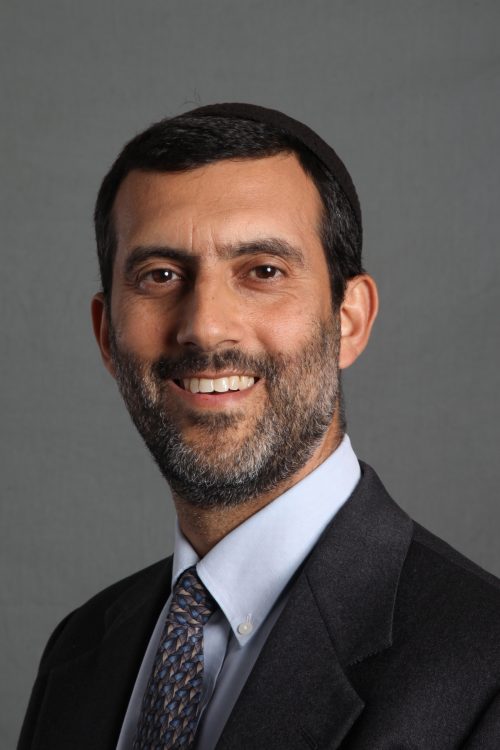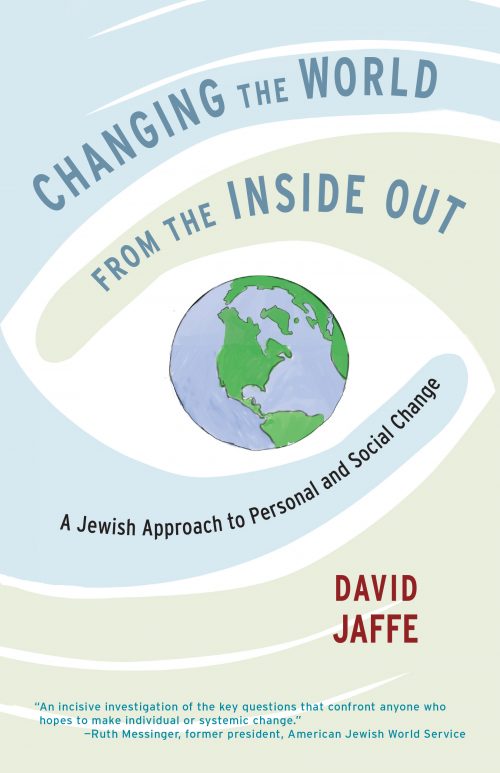Rabbi David Jaffe won the Jewish Book Council’s Myra H. Kraft Memorial Award in Contemporary Jewish Life and Practice in 2016 for his first book, “Changing the World from the Inside Out: A Jewish Approach to Personal and Social Change.” Jaffe recently spoke to JewishBoston about spiritual values and the practice of Mussar, which he explores in his literary debut.
Most people have never heard of the practice of Mussar. What are a few of its qualities that may attract someone to it?
Mussar means “applied ethics.” It’s a Jewish discipline through which we can redirect our lives in a positive direction. Mussar goes back to the Torah, but [was] developed as its own genre of religious literature in the 10th century. That literature included meditation practices, as well as practical instruction on how to become a humble, courageous people through living the Torah’s values. It also started a 1,000-year genre that has touched every part of the Jewish world, including the Kabbalists.
When was the modern Mussar movement launched?
Rabbi Yisrael Salanter founded the modern Mussar movement in the mid-19th century. He understood that unless people internalized their Judaism, they might lose it in modernity. As a great Mussar scholar once said, Mussar is a discipline that takes what we know in our heads and brings it into our hearts. It’s a practical wisdom deeply grounded in spirituality, but also a guide for how to talk to your children, your spouse, your neighbors. In other words, how do you live a daily life that aligns with your highest values?

What’s the role of Mussar in your life?
I had my own spiritual awakening as a young adult after the loss of a close friend; my political awakening followed soon after. I wanted to integrate that dual awakening as a spiritually-minded person who is living an ethical life in the world and making a difference. I’ve been sharing Mussar as a fellow practitioner and teacher for over a decade.
You spend a lot of time in the book talking about middot, or character traits. What’s their role in cultivating a meaningful life?
Middot encompass all the personality traits you can possibly think of. If our middot are not aligned, we are not living with integrity. When there is a gap in the way we want to be in the world and the way we actually act in the world, we can use Mussar and middot to align ourselves to bridge that gap. That’s a meaningful way of practicing your values and living your life.
You talk about Rebbe Nachman of Breslov in the book. How has his thinking influenced you and your study of Mussar?
Rebbe Nachman has had a big influence on my thinking. He taught me that God’s presence is always available: No matter how far away you think you are from God, the ability to connect to God is always there. Things are never static in a spiritual life. There are times when someone is really up and times when someone is really down. Rebbe Nachman teaches those are both spiritual moments: One needs to master the ups and downs, as well as the waxing and waning of a spiritual life. When you’re up, that’s a time to use your spiritual energy to keep going up. When you’re down, that’s the time to know God is close to you and things are integrating in you for the purpose of rebounding in your life.
Rebbe Nachman is also famous for encouraging his students to go outdoors or to find a private place to have a spontaneous conversation with God out loud in whatever language you wish. I’ve been talking to God on my own in the woods since I was 10 years old; only later did I realize that was actually a spiritual practice with which to build a relationship with God.
In these difficult times, many people are looking to affect change in their lives. What will they glean from your book to help them do that?
There’s an artificial separation between our inner, spiritual lives and our outer lives, which reflects the way we are in the world. Mussar bridges that gap. Judaism is a religion of transformation for us as individuals, but it also shows the transformation of the world from chaos to order, from creation to revelation and, ultimately, to redemption. My book demonstrates how this is one continuum of inner and outer change that influences the other. The changes we make on the inside of our lives, where we become more trusting and honorable people, has a big effect on how we honor others, as well as how we create laws and systems in our society. In terms of our current national situation, we must bridge the political divide by finding some point of connection where we can understand each other.
How do you hope to engage further with Mussar?
I want to bring Mussar to organizations and schools to help build a culture that aligns with the values of a particular institution. For example, I consult at Gann Academy, where we are working to align the values of the school with people’s actual behaviors. I’ve also been working with Keshet to affect similar change in the LGBTQ community. It’s cutting-edge work and I look forward to doing more of it.




